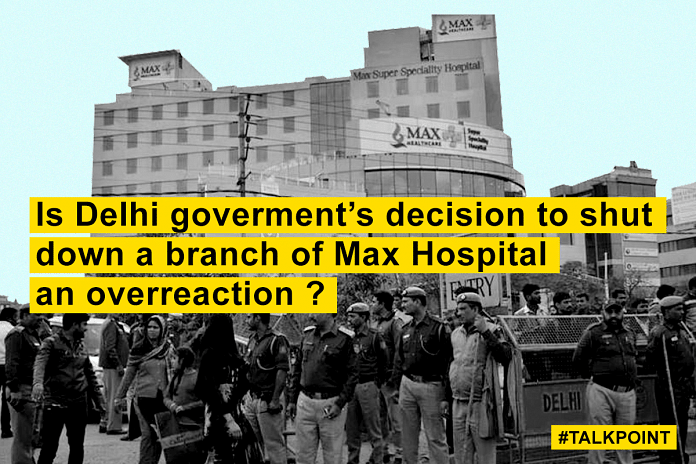ThePrint asks:
Is Delhi government’s decision to shut down a branch of Max Hospital an overreaction?
The Delhi government has taken a tough decision, undoubtedly. Closing down a large establishment is never easy. Especially if the institution is a large hospital, nearly two decades old, with influential shareholders and Directors, and a big brand name. The stakeholders are many, and powerful. Doctors belonging to the Delhi Medical Association are a united bunch. On the other hand, patients are upset and increasingly articulate.
The deed is done, but some questions emerge:
Why take such steps?
The populism in this case cannot be ignored. It makes great rational sense to capitalise on public mood to pass such an order. Governance these days is more and more about what the majority believes is right and the bigger the mob, quicker is the sentence passed. We saw this when the Union government recently capped stent prices. Therefore, on why the step was taken with such alacrity, the answer is obvious. It is a rational step for a politician to take, especially in today’s environment. Sacrificing ease-of-doing-business and shareholder value for assuaging popular anger against obvious profiteering and corruption allegations is what any leader would easily do.
Does Delhi have the authority to cancel the license?
Even if one were to argue that the step taken was moral and in the best interests of society, the law does not permit the government to close down a medical facility. It is true the hospital has not been fulfilling the 25% capacity reservation for the poor condition. But this was obviously not the reason for closure. The Delhi government has inexplicably not yet notified the Clinical Establishment Act of 2010. It has definitely given virtually free land to the hospital, and can withdraw that lease, but cannot unilaterally close down operations.
Read other perspectives on the issue:
Shailaja Chandra, former health secretary
What are the regulatory problems?
Regulating the health sector is not easy. The hospital sector is a classic oligopoly — it is difficult to regulate, there is huge information asymmetry between the provider and the patient and the regulator lacks the knowledge about the provider’s costs and quality of the services delivered. In this, the added complication is that we have a health sector that has both private and public sector suppliers of health care. There is no well-defined tort liability against damages, there is poor quality of monitoring and a woefully inadequate supply of doctors.
How do we prevent such actions henceforth?
Licence agreements can be suitably worked out with and built-in conditions in high technology areas. Large investments are needed both in the private and the public sector. In the last 17 years, only a little over 4 billion dollars has come as FDI in the health-care sector. For a sector set to grow to above 200 billion dollars, this is woefully small. FDI brings increased competition and quality. We need huge investments in the public sector too.
A clear definition of tort liability that penalises the doctor or the hospital appropriately must be introduced. Insurance mechanism need to be developed that not only cover mishaps but also oversee hospital quality. We must take tough decisions, but those that help solve the problem not simply apply a popular band aid.
The author is professor of Economics at the Maulana Azad National Urdu University, visiting faculty at ISB, teaches health economics at Manipal University.




Very true dear author.. I totally agree with the popular band aid thing.. Although there has been a grievous mistake and the loss is unacceptable, shutting the decades old institution is incorrect and convenient too..